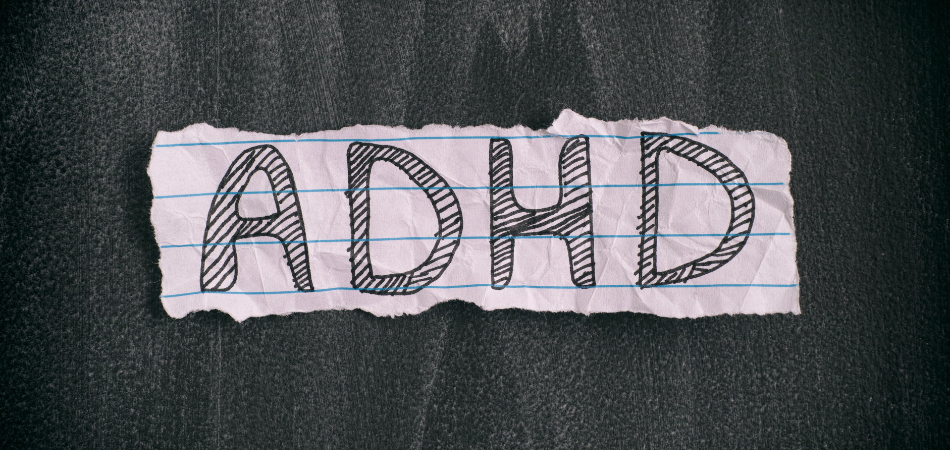ADHD and addiction

Written by:
Last Updated:
May 2nd, 2024
Individuals with ADHD are more likely to develop addictions to substances like alcohol and drugs, as well as behavioural addictions like gambling and compulsive spending. The good news is that there are effective treatments for ADHD and addiction. With proper diagnosis and treatment, you can go on to lead a healthy and successful life.
Attention Deficit Hyperactivity Disorder, or ADHD, is a neurological disorder that manifests as problems with focus, hyperactivity and impulsivity. It is one of the most common childhood disorders, affecting an estimated 5% of school-aged children. While it was once believed that ADHD was a childhood disorder, we now know that it can continue into adulthood, and as research has shown, there is a strong link between ADHD and addiction.
Signs and symptoms of ADHD
ADHD is a mental disorder that causes difficulties in both social and academic settings. You may struggle to pay attention, sit still or control your impulses. As a result, you may find it hard to complete tasks, follow instructions or stay organised. There are a variety of signs and symptoms that can present themselves in individuals with ADHD. In adults, hyperactivity tends to decrease and inattentiveness and impulsivity remain at the forefront. This puts ADHD sufferers at a greater risk of developing addiction as they are more likely to impulsively experiment with substances.
ADHD symptoms in adults may include:
- Being unable to finish a task or skipping from task to task
- Difficulty organising
- Making frequent, careless mistakes
- Being forgetful or losing things
- Inability to focus
- Restlessness
- Excessive talking or interrupting others
- Irritability and mood swings
- Inability to cope with stress
- Extreme impatience
- Impulsive and dangerous behaviours
- Little awareness of danger or risk
These symptoms can cause significant problems in your life, negatively impacting relationships, work or studies. Co-occurring disorders such as anxiety and depression are also frequently seen in those suffering from ADHD. All of these factors combined can push you towards substances as a way to cope.
If you have found your substance abuse spiralling out of control, don’t hesitate to contact us and get the help you need. Our team is experienced in treating mental health and addiction disorders and can give you the tools you need to live a happier life.
How are ADHD and addiction linked?
There is a strong link between ADHD and addiction. If you suffer from ADHD, you are at a much higher risk of developing a dependency for several reasons. These include:
Self-medication
You may turn to drugs or alcohol in an effort to self-medicate the symptoms of ADHD. For example, substances will appear to relax or calm you in times of restlessness or irritability. They might also initially help to ease subsequent anxiety or depression resulting from ADHD. However, it is important to remember that in the long run, these symptoms will only come back tenfold.
Impulsive behaviour
ADHD can lead to impulsive behaviour, which can increase the chances of engaging in risky activities like substance abuse. With little regard for danger or consequences, you are at a high likelihood of developing an addiction.
Inability to cope with stress
ADHD can interfere with your ability to adjust to the demands of adulthood, making it difficult to cope with stress. Turning to substances as a way to cope can quickly lead to addiction. As a result, it is important for people with ADHD to be aware of the risks of addiction and to seek treatment if they develop any symptoms.
Lack of commitment
An inability to focus and follow through with a task means that you may struggle to commit to treatment. Many people suffering from ADHD find it hard to stick to a treatment plan, so it is important to find a treatment facility that has experience dealing with both ADHD and addiction.
Despite the strong link between ADHD and addiction, it is possible to find effective treatment, learn how to manage your symptoms and live a fulfilling life. Sanctuary Lodge’s state-of-the-art facility can help you to tackle both conditions, allowing you to recover fully.
How do I know if I have an addiction?
You may be wondering if your substance use warrants treatment or if it is even an addiction at all. If your substance abuse is causing harm in any area of your life, however, it is possible that you have a problem. Taking the first step and admitting you need help is often the hardest part of recovery. If you’re not sure whether you have an addiction, take our quick quiz to find out:
- Do you feel like you need to use drugs or alcohol regularly in order to feel normal?
- Do you use drugs or alcohol to manage your ADHD symptoms?
- Do you use drugs or alcohol as a way to cope with negative feelings or stress?
- Have you ever tried to quit taking substances but been unable to stick to it?
- Do you continue using substances despite negative consequences, such as job loss or financial instability?
- Have you experienced any additional health issues as a result of your substance abuse?
- Does procuring and taking drugs or alcohol take precedence over other activities or responsibilities?
- Do you try to hide your drug or alcohol abuse from friends or family?
You don’t need to have answered yes to all of these questions to be suffering from an addiction – if you can relate to even one of these points, it is important to think about addiction treatment.
What is a dual diagnosis?
A dual diagnosis, also known as a comorbid condition or co-occurring disorder, is a term used to describe when an individual suffers from both a mental health disorder and a substance abuse problem.
Dual diagnosis is complicated because the two disorders can interact with and exacerbate each other. For example, someone with ADHD might turn to alcohol or drugs to self-medicate and ease their symptoms. Substance abuse can then worsen the symptoms of this disorder and make it more difficult to manage. Because of this, it’s important for anyone who has a dual diagnosis to receive treatment for both conditions simultaneously. Without addressing both problems, it’s unlikely that recovery will be successful.
What treatment is available for ADHD and addiction?
There are a variety of treatment options available for those struggling with ADHD and addiction. Inpatient rehab focused on treating both disorders simultaneously is often the most effective approach. This type of treatment allows for around-the-clock monitoring and support in a structured environment, which is crucial for those with ADHD who are at a higher risk for relapse.
Various therapies can be helpful in treating both ADHD and addiction, including:
- Cognitive behavioural therapy (CBT): a type of psychotherapy that helps you to change unhealthy thought and behaviour patterns.
- Dialectical behaviour therapy (DBT): helps you to develop coping mechanisms, regulate emotions and improve social skills and relationships
- Group therapy: helps you to feel less alone when facing your issues and allows you to build a strong network of support
- Other holistic activities: proven effective in combating symptoms of ADHD as well as addiction, you will be able to take part in numerous activities including yoga, mindfulness, exercise and acupuncture.
The most important thing when looking for a rehab facility is to find a treatment plan that works best for you and that you feel comfortable with. At Sanctuary Lodge, we are dedicated to providing you with a safe and secure environment to recover. With our support, it is possible to overcome both ADHD and addiction.
Tips for a successful rehab
Completing a rehabilitation programme is a challenge for anyone but it can be especially difficult for those with ADHD. Research has shown that people with ADHD have a higher likelihood of ending their treatment early, which can lead to relapse. However, there are a few things that can be done to increase the chances of success in addiction rehab for people with ADHD. Here are some tips that may help you:
- Find a rehab facility that meets your needs. You will need to consider the centre’s experience around both ADHD and addiction.
- Make sure you understand the programme and what is expected of you. This will help you to be more successful in completing the programme.
- Take advantage of resources and support that are available to you. There are often many people who want to help you succeed in rehab, so make sure to ask for help when you need it.
- Be patient with yourself. Rehab can be a long and difficult process but remember that every day is a new opportunity to make progress.
- Persevere even when things get tough. It’s normal to have setbacks during rehab but don’t let them stop you from reaching your goal of completing the programme.
- Create a supportive network of family and friends who can provide encouragement and accountability.
- Stay positive and motivated throughout the process. Remember that each day is a new opportunity to make progress towards your goals.
With these tips in mind, people with ADHD can increase their chances of success in rehab. It is important to remember that everyone’s experience in rehab is unique, so try not to compare yourself to others. Focus on your own recovery journey and trust that you have the strength and determination to succeed.





